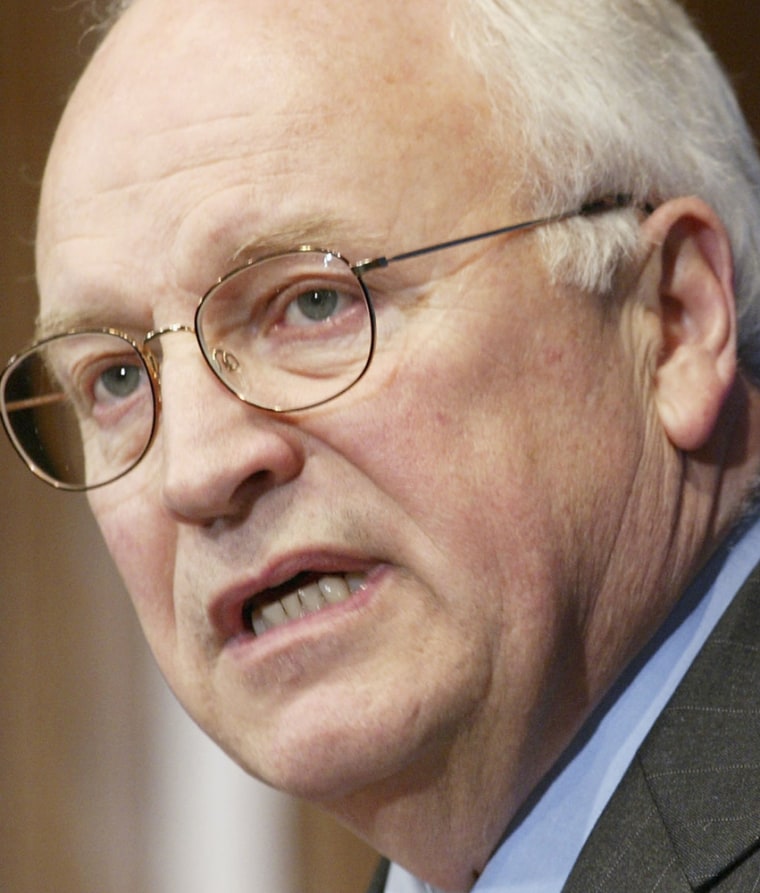Vice President Cheney on Friday vigorously defended his vulgarity directed at a prominent Democratic senator earlier this week in the Senate chamber.
Cheney said he "probably" used an obscenity in an argument Tuesday on the Senate floor with Patrick J. Leahy (D-Vt.) and added that he had no regrets. "I expressed myself rather forcefully, felt better after I had done it," Cheney told Neil Cavuto of Fox News. The vice president said those who heard the putdown agreed with him. "I think that a lot of my colleagues felt that what I had said badly needed to be said, that it was long overdue."
The forceful defense by Cheney came as much of Washington was discussing his outburst on the Senate floor in which a chance encounter with Leahy during a photo session in the usually decorous Senate chamber ended in colorful profanity. The obscenity was published in yesterday's editions of The Washington Post.
President Bush had made his vow to "change the tone in Washington" a central part of his 2000 campaign, calling bipartisan cooperation "the challenge of our moment."
"Our nation must rise above a house divided," he said in his victory speech in December 2000. "I know America wants reconciliation and unity. I know Americans want progress. And we will seize this moment and deliver."
No mood for pleasantries
Cheney said yesterday he was in no mood to exchange pleasantries with Leahy because Leahy had "challenged my integrity" by making charges of cronyism between Cheney and his former firm, Halliburton Co. Leahy on Monday had a conference call to kick off the Democratic National Committee's "Halliburton Week" focusing on Cheney, the company, "and the millions of dollars they've cost taxpayers," the party said.
"I didn't like the fact that after he had done so, then he wanted to act like, you know, everything's peaches and cream," Cheney said. "And I informed him of my view of his conduct in no uncertain terms. And as I say, I felt better afterwards."
Leahy, crossing the aisle to the Republican side of the chamber Tuesday, tried to make small talk with Cheney. Cheney yesterday referred to the incident as "a little floor debate in the United States Senate," although the Senate was not in session at the time. According to Leahy's staff, the Vermont senator answered Cheney's complaint about Halliburton with Democrats' complaints that the White House sanctioned a smear of Catholic Democratic senators over their objections to Bush's judicial nominees.
"Ordinarily I don't express myself in strong terms, but I thought it was appropriate here," Cheney said on Fox.
David Carle, Leahy's spokesman, said: "It appears the vice president's previous calls for civility are now inoperative."
Seeking common ground
As news spread on Thursday of the Cheney-Leahy exchange, Senate Minority Leader Thomas A. Daschle (D-S.D.) appealed to colleagues of both parties to rise above "partisan retaliation" and find a "common ground" for lawmaking.
Speaking first with reporters and then addressing the full Senate, Daschle acknowledged that earlier efforts by Democrats and Republicans to restore the Senate's once-cherished comity have yielded meager results. "But we have to try . . . to build a better relationship" between the political parties, regardless of which controls the Senate after the November elections, he said.
Daschle denied that he made his own civility proposals to boost Democratic campaigns, including his own hard-fought bid for reelection in South Dakota this fall. But his pitch for more bipartisanship -- coupled with a similar appeal Wednesday by House Minority Leader Nancy Pelosi (D-Calif.) -- underscored the perceived significance of voters' impatience with the partisan squabbling in Washington.
Daschle outlined what he called "fundamental commitments" that would undergird his efforts: to "deal in good faith with the executive branch"; to exert the "historical role of the Senate" on budget, oversight and nomination matters; to respect minority party rights, and to "end the cycle of partisan retaliation."
Among his proposals was full participation by both parties on House-Senate conference committees.
